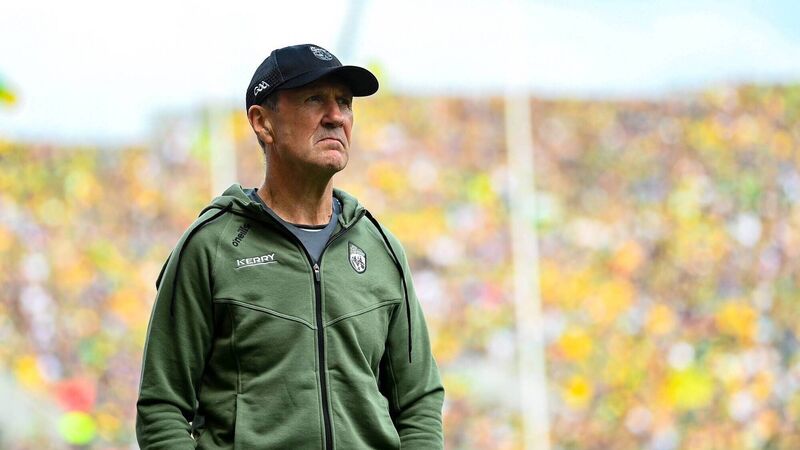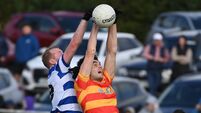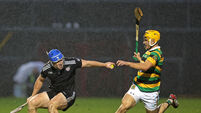Christy O'Connor on what it takes to be an All-Ireland winning manager

QUIET MOMENTS: Alone with his thoughts before the All-Ireland final, Kerry boss Jack O'Connor. Pic: Stephen McCarthy/Sportsfile
When Jack O’Connor spoke to the media after his Kerry side had beaten Armagh in the All-Ireland quarter-final in late June, O’Connor cut loose just like his players had over an hour earlier.
O’Connor clearly wanted to get some stuff off his chest. Armagh had been written up. Kerry had been written off. Proving people wrong has always been a huge motivation for O’Connor but he didn’t spare the rod on some of his own for how much the team had been criticised and pilloried.
“What’s to be gained by slating people?” asked O’Connor. “It’s the easiest thing in the world. I’m in the business of building people up. I’m not in the business of knocking people.
"I spent all my life coaching underage, schools, minors, U21s, seniors – every level.”
O’Connor certainly has. It’s 33 years since he first appeared as a selector with the Kerry U21s before being part of Paidí Ó Sé’s senior management team for the 1997 and 2000 All-Ireland wins. In between those years, O’Connor managed Kerry to the 1998 All-Ireland U21 title.
O’Connor wasn’t a well-known inter-county player but greatness was already beckoning in a different form.
O’Connor has done it at every level. Along with Mickey Harte and Dessie Farrell, he is the only manager to have led his county to minor, U21/U20 and senior titles.
After managing the minors to successive All-Irelands in 2014 and 2015, O’Connor subsequently took over the Kerry U21s for four seasons. After managing Kildare in 2020 and 2021, O’Connor returned home to complete unfinished business.
O’Connor’s service has been incredible but it’s been a theme of recent All-Ireland winning managers.
Since making his senior championship debut with Armagh in 1992, Kieran McGeeney has had an unbroken record of senior inter-county championship involvement either as a player, coach or manager.
Shortly after his retirement as a player in 2007, McGeeney was appointed Kildare manager, a position he held until September 2013.
After becoming a coach under Paul Grimley’s Armagh management in 2014, McGeeney took over as manager in 2015 and has been there ever since.
When Dessie Farrell stepped down as Dublin manager in June, the emotion in his voice when talking about the Dublin players was completely understandable considering how long Farrell had been involved in some of their careers.
“Some of those lads have been like kids to me, watching them grow up,” said Farrell.
Farrell had spent six years as senior manager but the relationship stretches back to the underage development teams he took charge of after his Dublin playing days ended in 2005, to the county minor and U21 teams that he regularly steered to All-Ireland finals, all of which cemented Farrell’s Dublin legacy.
Those last three All-Ireland winning managers are highly ambitious and driven individuals but their longevity also underlines how such a deep passion and love of the game has also defined such iconic careers.
It's a similar theme now with Stephen Cluxton’s involvement with Dublin’s new management under Ger Brennan. Cluxton did take two years out in 2021 and 2022 but 23 years of inter-county involvement with Dublin as a player has now been extended with his new role as a selector/coach. And who knows how long that may last?
Most of the figures with the profile of a Cluxton, McGeeney, O’Connor and Farrell are obsessive in their pursuit of excellence and exalted standards, but maturity and experience hones and shapes that obsession too along the way to enable them to keep going on such a long-haul journey.
A few years back, McGeeney mentioned in passing his admiration for a book called by Kevin Dutton, a professor of psychology, and Andy McNab, former SAS operative turned bestselling novelist, which combines McNab’s adventures with Dutton’s line in psychopathy.
It listed out the traits of the psychopath — charisma, charm, calmness under pressure, fearlessness, focus, impulsivity, lack of conscience, mental steel and ruthlessness. Dutton argues that none of those characteristics were inherently bad. Things only went off the rails when some traits overwhelmed the others.
McGeeney has repeatedly spoken in recent years about the importance of achieving balance, both for himself and his players. Experience also teaches highly-driven and focused individuals how to rein in obsession.
“One of the mistakes I made in 2004 was I was way too obsessive,” said O’Connor in an interview to Tony Leen in the Examiner after the 2022 All-Ireland win.
“The adrenaline was running for weeks and months and I didn’t savour it enough. I never got off the rollercoaster. By the start of 2005, I was burned out.
The word after the All-Ireland football final in July was that O’Connor was finally stepping away from a near 40-year all-consuming pursuit. O’Connor will be 65 next month.
It seemed time. Except it wasn’t. Not yet.
“At the time, I kept saying, 'I can’t put myself through this again,'” said O’Connor in another interview to Leen after this year’s All-Ireland. “Should I have had better dealing mechanisms? I probably should.
"But my whole identity is wrapped up in it. I can’t divorce my persona from that.”
Many of the game’s iconic figures are rarely able to make that separation from what they do. Because it is who they are.
And that’s what makes them so great in the first place.










 App?
App?







